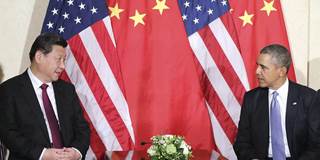The US should get off the sidelines and use its influence to help shape the design of China's new investment bank. In exchange for participating, the Obama administration should insist that the focus be on financing infrastructure projects that reduce carbon-dioxide emissions and meet the highest environmental standards.
WASHINGTON, DC – The United States, along with Canada and Japan, has been conspicuously absent from the discussions regarding the establishment of the Asian Infrastructure Investment Bank (AIIB). A total of 57 countries – from Europe, Asia, and Latin America – have joined the Chinese-led effort to spend $100 billion on roads, rail lines, bridges, and harbors throughout the region. But President Barack Obama’s administration has remained reluctant to join – much to the bewilderment of China’s government.
Continuing to maintain that stance would be a mistake. The US has an opportunity to influence the AIIB’s design without looking like it is reversing course. In exchange for participating in the institution, the Obama administration could and should insist that the AIIB focus on financing infrastructure projects that reduce carbon-dioxide emissions and meet the highest environmental standards.
The need for infrastructure investment in Asia’s emerging economies is vast. Generally, as a country’s household income rises, the share of spending on food declines, while spending on transportation rises sharply. And most developing countries in Asia have reached an economic stage at which large segments of their populations will soon be able to afford cars and plane travel for the first time.

WASHINGTON, DC – The United States, along with Canada and Japan, has been conspicuously absent from the discussions regarding the establishment of the Asian Infrastructure Investment Bank (AIIB). A total of 57 countries – from Europe, Asia, and Latin America – have joined the Chinese-led effort to spend $100 billion on roads, rail lines, bridges, and harbors throughout the region. But President Barack Obama’s administration has remained reluctant to join – much to the bewilderment of China’s government.
Continuing to maintain that stance would be a mistake. The US has an opportunity to influence the AIIB’s design without looking like it is reversing course. In exchange for participating in the institution, the Obama administration could and should insist that the AIIB focus on financing infrastructure projects that reduce carbon-dioxide emissions and meet the highest environmental standards.
The need for infrastructure investment in Asia’s emerging economies is vast. Generally, as a country’s household income rises, the share of spending on food declines, while spending on transportation rises sharply. And most developing countries in Asia have reached an economic stage at which large segments of their populations will soon be able to afford cars and plane travel for the first time.